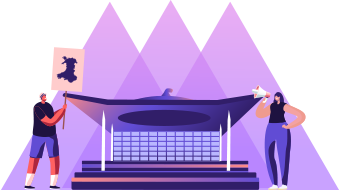
For many people, volunteering can be an excellent opportunity to use knowledge and skills that have been developed at work for the benefit of their community or another organisation, or develop new skills and knowledge. It can also be a way to make sense of experiences you may have had in your personal life and use them for good. Others volunteer within their current workplace for the benefit of their co-workers. Below, be inspired by five colleagues whose volunteering has a professional, but also often a very personal, focus.
Catherine - Public Mental Health Committee volunteer, The Mental Health Foundation
“If you feel like your life isn’t fully fulfilled, then look for volunteering opportunities. Because, actually, what pays the rent may not fulfil you completely; there are other ways of doing that.”
Although Catherine had worked in the mental health sector previously, it was the loss of a friend to suicide that motivated her to “do more to help reach people who perhaps aren’t accessing services but are really struggling”. At first, she applied to be a trustee of the Mental Health Foundation, but was unsuccessful; the charity instead asked her to join their Public Mental Health Committee.
Michelle - Patient voice and volunteer
“Your perspective, your voice, and your experience are valid and valuable, and you should use them.”
Michelle has a professional background working in the voluntary sector, but it was her own experience of having a premature baby that led to her supporting the work of two charities: Bliss, which supports people who have experience of premature birth or whose babies are receiving special care, and Tommy’s, which does a lot of work around pregnancy, premature birth, and miscarriage.
Amo - Founder of The Open University's Trans Staff Network
“Find out what’s actually involved in volunteering before you rule yourself out of it – you may be surprised.”
The idea of setting up a network for trans colleagues at The Open University came to Amo while laying awake in bed early one morning. He knew that there were other trans people at the University, but there was no platform for them to connect with, and support, each other. He also felt that, although there was an LGBTQ+ network, it wasn’t very easy to connect with other trans people.
Sarah - Volunteer policy adviser, Children in Wales
“Too many people worry about doing things absolutely perfectly or having to commit bucketloads of time, but you can make it work and organisations will help you. So do it!”
Volunteering is central to who Sarah is. In the past, she has been a trustee, a volunteer policy advisor for the charity Children in Wales, a Royal Navy Reservist, a volunteer with an armed forces youth group, a community councillor, and a school governor. Some of these experiences are more recent, while others are from when she was much younger, even as a child. She thinks those experiences in her formative years have shaped the person that she is today.
Stephen - Bereavement volunteer
“Give it a go – unless you try, you’re not going to know.”
Stephen volunteers a couple of hours a week as a phone-based bereavement volunteer for the charity Cruse Bereavement Support. He has always been interested in mental health, and his work at The Open University in Wales involves supporting students’ mental health, but it was his personal experience that led to his volunteering.

This resource is part of the Active Citizenship in Wales collection.
Discover more on the collection homepage.





Rate and Review
Rate this article
Review this article
Log into OpenLearn to leave reviews and join in the conversation.
Article reviews